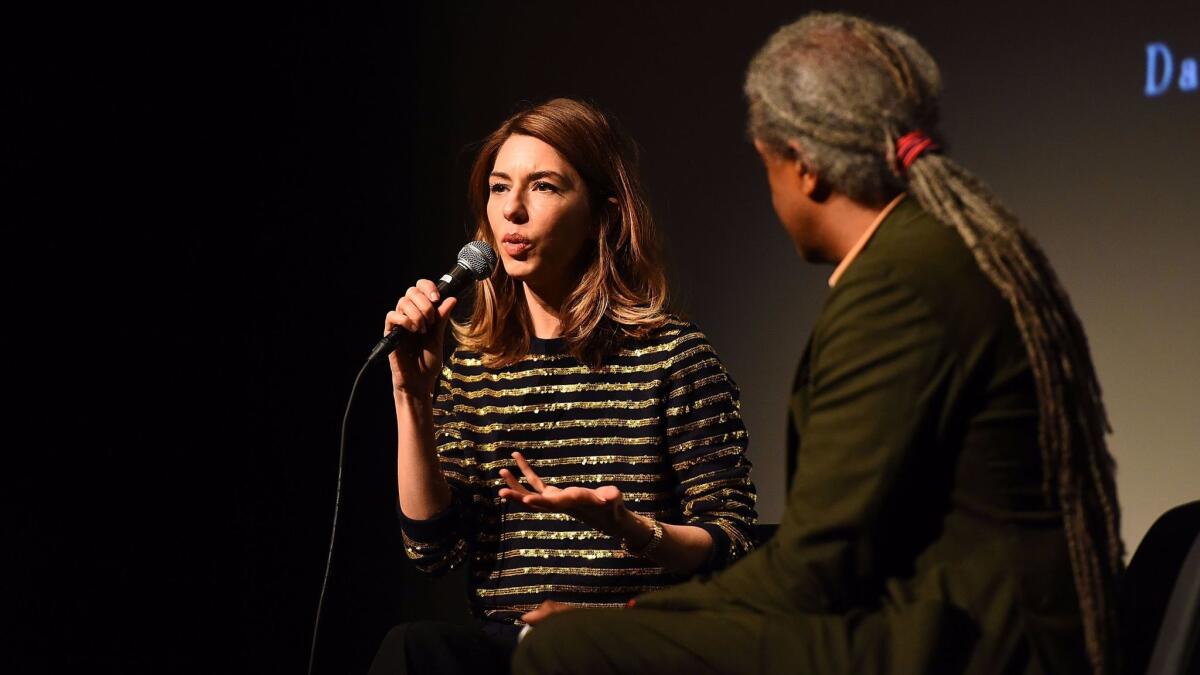Sofia Coppola’s ‘Beguiled’ buzz tour of L.A. and why her Civil War thriller focuses on women but not race
- Share via
After spending a little too much time in Calabasas making her last film, “The Bling Ring,” Oscar-winning filmmaker Sofia Coppola needed a change of scenery.
“I knew after I did that movie I wanted to do something beautiful because that was such a tacky, ugly world,” the filmmaker said Thursday night at LACMA after screening her new film “The Beguiled,” a period thriller filled with corsets, not Louboutins, but still plenty of sizzling melodrama.
She found rich material to mine in Thomas P. Cullinan’s 1966 novel “The Beguiled,” a potboiler about an injured Union soldier hidden in a boarding school full of Confederate women in the waning days of the Civil War.
“That world was very exotic,” said Coppola, who filmed on location in Louisiana at the same plantation house that appeared in Beyoncé’s “Lemonade.” “It was very different from how I grew up, the idea of Southern ladies and all the sexual repression in the heat of the South.”
Last month Coppola, 46, became the first American woman to win the Cannes Film Festival directing prize for the film, her sixth feature, which she adapted from the original novel with a few tweaks, most notably an emphasis on a strong female perspective.
Strong buzz, star power and those Cannes award plaudits propelled the Focus Features release through a whirlwind week of promotion, a star-studded premiere, and sold-out previews across Los Angeles ahead of its June 23 release.
Coppola’s naturalistic approach builds unspoken tension between the women of the house — led by Nicole Kidman, Kirsten Dunst and Elle Fanning — and Colin Farrell as the wounded Yankee soldier whose arrival quickly upends the balance of sisterhood and decorum within their walls.
Told from the point of view of its complex female characters, “The Beguiled” joins films like “The Virgin Suicides” and “Marie Antoinette” in Coppola’s continuing oeuvre of women-centric stories. The tale set on the eve of Northern victory does not, however, address slavery or race, or directly grapple with the role these women might have played in the social system burning down around them.
In conversation with Film Independent’s Elvis Mitchell at a special Los Angeles Film Festival screening at LACMA, Coppola explained why she deliberately chose not to include a character present in both the source novel and a 1971 adaptation directed by Don Siegel, starring Clint Eastwood as the morally ambiguous interloper.
“In the book there was a slave character … and it was treated in a very stereotypical way,” she said of the portrayal of the character, played in the 1971 film by blues singer and actress Mae Mercer. “It didn’t seem respectful. I thought it was too big of a subject to brush over lightly, so I decided not to have that character at all.”
The conversation around that choice didn’t come up much as Coppola and her stars kicked off their “Beguiled” tour of Los Angeles last week with a swanky DGA premiere on Monday night and Sunset Tower after-party attended by Rashida Jones, Mira Nair, Paris Hilton, Courtney Love, Maya Rudolph and Paul Thomas Anderson.
On Wednesday, a 35-millimeter screening of the film paired with the 1971 version drew Quentin Tarantino out to host a Q&A at his New Beverly Cinema, where fans lined up at 8 a.m. and waited in the 84-degree summer heat for tickets to the sold-out show.
There, the “Hateful Eight” helmer praised the subtle differences wrought by Coppola’s shift in perspective and restrained tone that grant its female characters more depth and complexity than in the 1971 film, which Siegel and Eastwood made a year before they teamed on “Dirty Harry.”
“In the [1971 film] they’re more deranged,” Coppola said of the women in her film, which also forgoes the sensational incest plot line and racy sex scene prominent in the Eastwood flick. “I wanted to make them more relatable and composed, even though the situation is heightened.”
Speaking at LACMA the next day between screenings of “The Beguiled” and her 2003 sophomore feature, “Lost in Translation,” Coppola considered how growing up moving around on location with her filmmaker-father, Francis Ford Coppola, led to a fascination with the interior life and relationships of women that have seeped into her films since “The Virgin Suicides.”
“I was always the new kid at school,” she said. “I learned how to read all the codes in a tribe and how to assimilate. That’s probably why I’m interested in that.”

“So much of [‘The Beguiled’] is about this group of women and how they communicate in a nonverbal way — with a glance, or their tone, how it communicates so much,” she said. “I think that’s unique to women.”
Coppola joked that it had been a while since she’d seen “Lost in Translation,” “so I hope it holds up.”
“I was writing it at my dining table when I lived in Los Feliz as a lonely trophy wife, and I thought it was very self-indulgent and that nobody would care about these characters,” she said with a laugh. The film, starring Scarlett Johansson and Bill Murray, went on to earn her the Academy Award for best original screenplay. “I was really surprised that anybody connected with them. It’s been really exciting that people did.”
ALSO
Sofia Coppola makes ‘The Beguiled’ a Southern Gothic tale all her own
The politics behind Cannes’ boos for Sofia Coppola’s ‘Marie Antoinette’
Cannes diary: Closing thoughts on a so-so festival but a satisfying set of winners
More to Read
Only good movies
Get the Indie Focus newsletter, Mark Olsen's weekly guide to the world of cinema.
You may occasionally receive promotional content from the Los Angeles Times.











